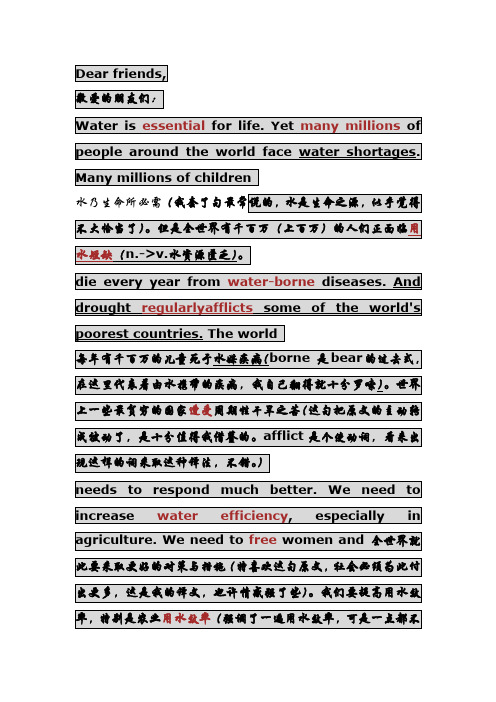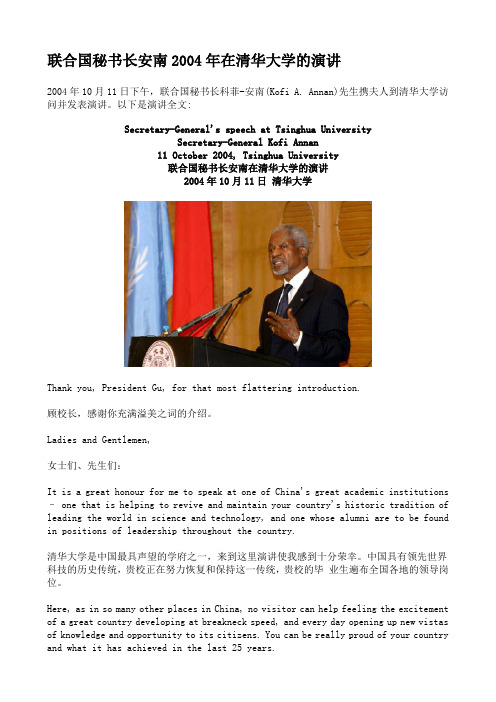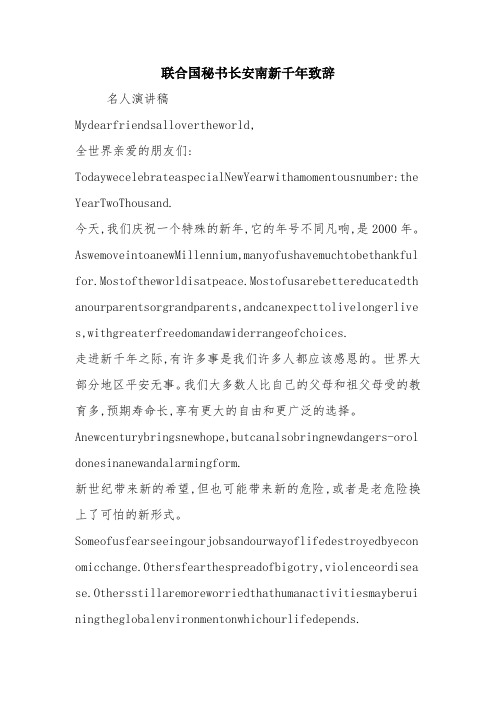安南秘书长在清华大学的演讲
联合国秘书长安南传记

世界总统安南作者:斯人书籍简介他生在非洲部落酋长之家,却接受了良好的西式教育;他热爱自己的祖国,却很少提到自己是加纳人,而以一个非洲人来称呼自己;他被人称为“世界总统”,却没有任何实际的政治权力,没有任何领土归他管辖,没有任何军队供他调遣;作为联合国秘书长,他有太多的麻烦和困扰,但他始终保持乐观;他是那么引人注目,却是个低调的人,让人觉得他在尽力避免别人的目光;他既有着高贵的品质,也不乏普通人的生活原则;他永远让人感觉处于一种平和的状态……安南档案全名:科菲·安南(Kofi A.Annan)国籍:加纳出生日期:1938年4月8日出生地:加纳库马西父亲:亨利·雷金纳德·安南(阿桑特部落酋长)母亲:维多利亚.安南(芬提族)身高:5英尺9英寸(1.75米)婚姻情况:已婚第一任妻子:索妮亚(尼日利亚)第二任妻子:娜内·拉格尔格伦(瑞典)学历和学位:美国麦卡莱斯特学院,经济学学士美国麻省理工学院,管理学硕士专长:通晓英语、法语和多种非洲语言,擅长演讲、调停和谈判爱好:爵士乐,古典音乐,足球,跳舞现职:联合国秘书长行动指南:尊严、自信、勇气、同情心和信仰。
安南大事记1938年4月8日生于加纳库马西市。
1954年至1957年进入加纳著名的英国寄宿学校学习。
1958年在库马西科技大学接受高等教育。
1959年离开加纳,前往美国求学。
1961年在美国明尼苏达州圣保罗市的麦卡莱斯特学院,获得经济学学士学位。
1961年至1962年:在瑞士日内瓦攻读国际事务研究生课程。
1962年:成为联合国下属的世界卫生组织(WHO)的预算干事。
1972年:获得美国麻省理工学院管理学硕士学位。
1974年至1976年:返回加纳,担任加纳旅游发展公司总经理。
1976年:任联合国驻开罗紧急部队民事长官。
1980年:任日内瓦联合国高级难民署负责人。
1990年:海湾战争爆发后,被委派至前南斯拉夫,负责遣返900名联合国工作人员、谈判释放西方人质和协助解决滞留在海湾地区的50万亚洲人的问题。
安南讲话

our lifeline for survival, and for sustainable development in the 21st century. Together, we must manage them better. 在这个世界水日,让我们下定决心更加努力地工作, 在这个世界水日, 个世界水日 让我们下定决心更加努力地工作,为世界上所 有人提供安全、清洁的水。让我们重申我们的承诺,更好地管理 有人提供安全、清洁的水。让我们重申我们的承诺, 世界上的水资源,因为水是我们赖以生存的生命线, 世界上的水资源,因为水是我们赖以生存的生命线,也是 21 世 生命线 纪可持续发展的命脉。 纪可持续发展的命脉。 原文中两个 together,被巧妙得用重申 命脉 (原文中两个 ( 被巧妙得用重申 一词链接,很值得称道,而且,还将其增词,将原因状语后置。 一词链接,很值得称道,而且,还将其增词,将原因状语后置。 lifeline 也根据句子不同,用两个词语来阐释,生命线和命脉。 也根据句子不同,用两个词语来阐释,生命线和命脉。 哎,没想到吧。 没想到吧。 )
觉得累赘。 觉得累赘。water shotage,water efficiency,都采用相同 都采用相同 的译法。 ) 的译法。 girls from the daily chore of hauling water, often over great distances. We must involve them in decision-making on water 我们要把日常运水并且经常是长途跋涉运水的负担从妇女和女 我们要把日常运水并且经常是长途跋涉运水的负担从妇女和女 长途跋涉 ( 是使某人免除..译文中用 童肩头卸下来 free sb. from...,是使某人免除 译文中用 卸 是使某人免除 译文中用“卸 下负担”来串联十分自然。我是用了免受这样的字眼。 下负担 来串联十分自然。我是用了免受这样的字眼。可是对于 来串联十分自然 免受这样的字眼 “daily chore ,over great distance"翻得还不够到位。 翻得还不够到位。 翻得还不够到位 ) 我们必须要让她们参与水资源的决策。 我是采用分句了:我们 我们必须要让她们参与水资源的决策。 我是采用分句了: (我是采用分句了 ( 必须要让她们也参与进来,为水资源的管理出谋划策。 必须要让她们也参与进来,为水资源的管理出谋划策。 她们也参与进来 出谋划策 ) management. We need to make sanitation a priority. This is where progress is lagging most. And we must show that water 我们必须把环卫作为一项优先任务(个人十分喜欢这个句型, 我们必须把环卫作为一项优先任务(个人十分喜欢这个句型, make..a priority,我翻得就多少失了些官话味了:我们尤其 我翻得就多少失了些官话味了: 我翻得就多少失了些官话味了 要重视对卫生设施的改进) 而目前进展最慢的就是这方面的工作 要重视对卫生设施的改进) 动词化了,我的: (它把 progress 动词化了,我的:而目前这是最为薄弱的一 个环节了。似乎有些过分意译了哦。 ) 个环节了。似乎有些过分意译了哦。 resources need not be a source of conflict. Instead, they can be a catalyst for cooperation. Significant gains have been
联合国秘书长安南2004年在清华大学的演讲

联合国秘书长安南2004年在清华大学的演讲2004年10月11日下午,联合国秘书长科菲-安南(Kofi A. Annan)先生携夫人到清华大学访问并发表演讲。
以下是演讲全文:Secretary-General's speech at Tsinghua UniversitySecretary-General Kofi Annan11 October 2004, Tsinghua University联合国秘书长安南在清华大学的演讲2004年10月11日清华大学Thank you, President Gu, for that most flattering introduction.顾校长,感谢你充满溢美之词的介绍。
Ladies and Gentlemen,女士们、先生们:It is a great honour for me to speak at one of China's great academic institutions – one that is helping to revive and maintain your country's historic tradition of leading the world in science and technology, and one whose alumni are to be found in positions of leadership throughout the country.清华大学是中国最具声望的学府之一,来到这里演讲使我感到十分荣幸。
中国具有领先世界科技的历史传统,贵校正在努力恢复和保持这一传统,贵校的毕业生遍布全国各地的领导岗位。
Here, as in so many other places in China, no visitor can help feeling the excitement of a great country developing at breakneck speed, and every day opening up new vistas of knowledge and opportunity to its citizens. You can be really proud of your country and what it has achieved in the last 25 years.和在中国其他许多地方一样,凡是来到清华大学参观的人,都不能不对伟大中国突飞猛进的发展,每天给人民带来的新的知识和机会而感到兴奋。
安南:两任秘书长,风雨十年路

平坦仕途1962年,24岁的安南进入世界卫生组织日内瓦办事处,其后在联合国非洲经济委员会等部门工作。
1976年,38岁的安南调到纽约联合国总部,便开始了攀登权力顶峰的道路。
1992年,安南升为负责维和事务的副秘书长。
1995年8月底,安南的一个重要决定使他得到了美国克林顿政府的青睐。
当时,安南不顾秘书长加利的反对,批准北约轰炸南联盟塞族部队。
就在这一年的秋天,克林顿政府对加利的耐心终于耗尽,开始组建一个工作组阻止加利连任。
1996年3月,这个小组提出一份秘密备忘录,中间只提到一个接替加利的人选:安南。
最终,安南成为第七任联合国秘书长,也是出身联合国工作人员行列的第一位秘书长。
世界"总统"在安南任职的10年,联合国的角色也发生了根本转化。
两极格局的终结使世界各地潜伏的冲突和矛盾不断释放,全球化的深入发展促使联合国承担起更多的全球责任,联合国的行动变得更具实质内容。
维持和平、推动发展、防治疾病、发展人权……一项项任务排满了秘书长的日程。
有人把联合国比喻成一个长着192颗脑袋的庞然大物,每颗脑袋都有自己的想法和要求。
掌管这个庞然大物十年之久的科菲·安南,没有军队,没有政治权力,没有国土。
如今,他走了。
安南:两任秘书长,风雨十年路他多次呼吁国际社会关注非洲的贫困问题,促使各国制订千年发展目标,呼吁各成员国加强合作,并通过联合国协调国际社会应对贫困、艾滋病和教育等严峻的社会问题。
他对国际和平的贡献也是有目共睹。
无论是非洲战乱、中东危机,还是东帝汶暴乱、阿富汗战争,或者是在其他非常敏感的政治危机中,都有他穿梭斡旋的身影。
他在1998年伊拉克危机中表现出了高超的外交才能和勇气。
他亲赴巴格达,与萨达姆一起抽雪茄,说服萨达姆与美英达成协议,至少在半年多的时间里避免了一场轰炸。
萨达姆称安南是一个勇敢的人,美国人也称安南是最为出色的联合国秘书长。
第一任期的5年是安南秘书长生涯的黄金时期。
安南在浙江大学演讲全文

安南在浙江大学演讲全文XX年10月14日联合国秘书长安南在访华发表的3000字的演讲稿中,竟用了1800字谈中国艾滋病的防治。
(讯)联合国秘书长科菲·安南XX年10月14日在位于中国杭州的浙江大学接受名誉博士学位,并发演出讲。
上海新民周刊在第200期中全文刊出安南这次演讲的全文。
现引录如下——尊重的列位教职员,亲爱的年轻朋友们:你们好!我对贵校今天给我的荣誉深表感激。
来到这座以秀丽湖光和文化宝藏著称的传奇般的城市,我十分高兴。
此刻我才知道为何人们说:“上有天堂,下有苏杭。
”在这里学习,必然灵感无穷。
像贵校这样的学府对于联合国极为重要。
你们在培育年轻人的全世界视野方面发挥关键作用。
你们探讨新思维,借以推动和鼓励人类进步,同时推动和鼓励联合国的工作。
你们推动变革,塑造未来。
我知道,贵校通过齐全的学科门类和同世界各地其他大学的许多伙伴关系,为贵校学生做好全面的准备,迎接眼前的挑战。
亲爱的年轻朋友们,你们是中国的下一代,今天有机缘直接对你们发言,我感到特别高兴。
听说中国有一句古老的谚语,世界各地的人都喜欢引用:“愿君生逢激荡时”。
可是,莫非只有生于乱世才算生逢激荡?莫非就没有好事可以激荡人世?我以为那是可能的。
我希望,尤其希望你们这一代,会发现生逢激荡是造化福分。
你们离开校园时无论选择哪一条道路,你们都会进入一个全世界化的世界。
一国发生的情况也影响其他国家。
流行病、环境退化、恐怖主义对咱们大家都组成挑战。
科学冲破、信息技术、经济一体化可能使咱们大家都受益。
你们这一代面临的最大挑战是确保全世界化成为做好事的力量,不仅造福于特权少数,而且也造福于全人类。
中国的作为,中国的成绩,将帮忙将决定全世界如何应对这一挑战。
中国已经起步,已经显示出力量。
贵国的经济增加速度使几乎所有其他国家都感到羡慕。
目前,全世界经济不景气,贵国则继续增加,像这样的国家寥寥无几。
你们在减少贫困方面已经取得进展,这一进展的幅度在人类历史上是空前的。
世界的未来属于青年人的演讲稿

世界的未来属于青年人的演讲稿
世界的未来属于青年人的演讲稿
模拟联合国活动对优秀青年人的成长与发展具有重要意义。
联合国前任秘书长科菲·安南先生曾在一封致模拟联合国大会的贺信中对青年朋友们说到:“联合国依靠世界上每个人的努力而存在,尤其是你们这样的青年。
这个世界,不久就会是你们的`”。
想说的第一个词语:态度。
在模拟联合国中每个人都是一个国家的外交官,代表们通过几天的会议能够体会到一个外交官的职责与重任。
通过模拟联合国,你会看到一个地球却有多个世界,你会看到这个世界上有多种不和谐,你会意识到拯救地球任重而道远,每个人都应该承担一份责任。
我理解的最重要的词:知之。
能够通过代表不同的国家,认识到国家之间互相了解和互相包容的重要性。
真实的世界纷繁复杂,如果每个国家都能站在其他国家的角度上换位思考问题,如果每个人都能够体认和包容文化差异,那么这个世界就会少一些战火和冲突,多一些和平和快乐。
模拟联合国是一个优秀同龄人的聚会。
在模拟联合国活动中,参与者可以在同龄人身上看到自己身上的不足,也会结实很多志同道合的好友。
在模拟联合国的世界里,无论你来自那里,无论你有怎样的背景,无论你代表哪个国家,所有人都有着同一个梦想:使我们的世界更加和平与美好。
亲爱的联合国秘书长安南先生

亲爱的联合国秘书长安南先生:您好!我们是居住在海外的中国人,今天给您写信,主要是想就日本要求加入联合国安理会常任理事国一事,表达我们的看法、意见和要求。
请您在百忙之中亲阅此信,因为这不仅代表旅居海外的华人心声,也代表亿万中国人民的心声。
我们认为,联合国安理会是维护世界和平的最重要的国际组织,常任理事国又是该组织核心的核心,对于维护世界和平所起的作用非常之大。
正是由于它的这种作用和地位,就更加要求常任理事国必须和平、民主,并且能和世界各国都保持友好的关系,这样才能为维护世界和平起到领导国的作用。
日本在世界上发动过数次侵略战争,由于它是一个战败国,国际社会规定在二战后日本坚决不能保留军队,只能有国防自卫队,而实际上日本现在的武装程度、军费开支等远远超过亚洲其他国家水平,对亚洲国家的和平已构成严重威胁。
直到现在,日本仍不断侵犯中国、朝鲜、苏联等国的领土。
小泉政府上台后所奉行的一系列政策也不难看出日本这个国家对于世界和平的态度,对于二战中所犯下的侵略事实拒不承认,并且数次篡改教科书,小泉纯一郎作为国家元首,数次参拜供奉着甲级战犯牌位的靖国神社,给亚洲人民的感情带来了巨大的伤害,也为亚洲的和平埋下了隐患。
另外,近期日本居然和美国签订了把台湾纳入日美安全防务体系范围之内的所谓协议,这是对中国国内事务的最大干预,对中国主权的严重侵犯。
近期联合国要进行一系列的改革行动,日本在这个时候要求加入联合国安理会常任理事国,并且是与德国、巴西、印度等其他几国联合要求入常,我们认为联合国常任理事国不应该接纳这种结盟入常的做法,哪个国家合格就进入,哪个国家不合格就不能进入,不能四国或几国同时结盟加入。
联合国常任理事国是维护和平的,不是世界上某个国家的法码。
不能让奉行军国主义的国家打着和平的旗号干着破坏世界和平的勾当!通过上述事实完全可以看出,日本对于他们所犯下的战争罪行不但没有丝毫悔改,反而变本加厉,这是中国和亚洲所有受二战侵略、奴役的国家和人民所不能接受和容忍的。
优秀演讲主持讲话稿:联合国秘书长安南新千年致辞

联合国秘书长安南新千年致辞名人演讲稿Mydearfriendsallovertheworld,全世界亲爱的朋友们: TodaywecelebrateaspecialNewYearwithamomentousnumber:the YearTwoThousand.今天,我们庆祝一个特殊的新年,它的年号不同凡响,是2000年。
AswemoveintoanewMillennium,manyofushavemuchtobethankful for.Mostoftheworldisatpeace.Mostofusarebettereducatedth anourparentsorgrandparents,andcanexpecttolivelongerlive s,withgreaterfreedomandawiderrangeofchoices.走进新千年之际,有许多事是我们许多人都应该感恩的。
世界大部分地区平安无事。
我们大多数人比自己的父母和祖父母受的教育多,预期寿命长,享有更大的自由和更广泛的选择。
Anewcenturybringsnewhope,butcanalsobringnewdangers-orol donesinanewandalarmingform.新世纪带来新的希望,但也可能带来新的危险,或者是老危险换上了可怕的新形式。
Someofusfearseeingourjobsandourwayoflifedestroyedbyecon omicchange.Othersfearthespreadofbigotry,violenceordisea se.Othersstillaremoreworriedthathumanactivitiesmayberui ningtheglobalenvironmentonwhichourlifedepends.有些人担心,经济变化会毁掉我们的就业机会和生活方式。
- 1、下载文档前请自行甄别文档内容的完整性,平台不提供额外的编辑、内容补充、找答案等附加服务。
- 2、"仅部分预览"的文档,不可在线预览部分如存在完整性等问题,可反馈申请退款(可完整预览的文档不适用该条件!)。
- 3、如文档侵犯您的权益,请联系客服反馈,我们会尽快为您处理(人工客服工作时间:9:00-18:30)。
安南秘书长在清华大学的演讲Secretary-General's speech at Qing Hua University2004年10月11日,清华大学联合国秘书长安南10月10日抵京,开始对中国进行为期4天的正式访问。
10月11日,安南在清华大学发表演讲,与清华学子畅谈和平与发展。
安南曾于1997年5月、1998年3月、1999年11月和2001年1月四次访华。
科菲·安南(KofiA.Annan)1938年4月8日出生于加纳库马西市,早年就读于加纳库马西理工大学,曾到美国和瑞士留学,先后获美国明尼苏达州麦卡莱斯特学院经济学学士学位和麻省理工学院管理学硕士学位。
1996年12月17日,第51届联大任命安南为联合国第七任秘书长。
2001年6月,联大通过安理会提名安南连任秘书长,任期至2006年12月31日。
2001年10月,安南与联合国同获当年诺贝尔和平奖。
Thank you, President Gu, for that most flattering introduction.Ladies and Gentlemen,It is a great honour for me to speak at one of China's great academic institutions – one that is helping to revive and maintain your country's historic tradition of leading the world in science and technology, and one whose alumni are to be found in positions of leadership throughout the country.Here, as in so many other places in China, no visitor can help feeling the excitement of a great country developing at breakneck speed, and every day opening up new vistas of knowledge and opportunity to its citizens. You can be really proud of your country and what it has achieved in the last 25 years.As I look out over the young faces in this audience I cannot help envying the international students – more than a thousand, I am told, from over 50 countries – who have the privilege of sharing your learning experience here.It reminds me for a moment of my own student days, when my country, Ghana, was newly independent. We felt we were suddenly reaching out to the world, and making new discoveries every day.But then I also remember that times of rapid change can bring pain and confusion, even destruction, as well as progress and excitement.The more rapid and exciting it is, the more change calls for careful management, and wise, humane leadership.Order and stability have to be preserved, but without choking off the freedom to enquire, and experiment, and express oneself, since – as you young researchers know better than anyone –knowledge and science have a vital role in national development.And technical expertise needs to be harnessed to the development and security of society as a whole, so that it not only creates greater wealth for the few, but enables all citizens to feel safer and more prosperous.The development of such a great country as China cannot happen in isolation. It affects the whole world, and it draws you into new relationships with other parts of the world.Increasingly, your economy depends on exchanges with other countries – both imports and exports, of both goods and capital. Foreign investment plays an essential role in your growth, while your holdings of foreign currencies – and your management of your own currency – are coming to play a vital part in the international monetary system.This means that you have a stake in the development and prosperity of the wider world. And your security, too, depends on international peace and stability.Your government shows that it understands this, by the role that it plays in the United Nations, and elsewhere. And increasingly, Chinese citizens are called on to take risks, and make sacrifices, in the interests of global security. It was impressive to see, in our newspapers the other day, pictures of Chinese policemen in blue helmets preparing to join the United Nations mission in Haiti – an island buffeted by both human and meteorological storms, which is literally on the far side of the world from here.So I am here, in part, to express the world's gratitude. Clearly you in China have understood, as your saying goes, that we all “share the same breath”. Human misery knows no front iers, and nor should human solidarity.Indeed, solidarity was one of the fundamental values solemnly reaffirmed, four years ago, by the political leaders from all over the world who met at United Nations Headquarters, and issued the Millennium Declaration.They declared that “global challenges must be managed in a way that distributes the costs and burdens fairly... Those who suffer or who benefit least deserve help from those who benefit most.”They promised to “spare no effort” to free more than one billi on of their fellow men, women and children from extreme poverty, and to make the right to development a reality for all.And they set themselves precise benchmarks by which their success in keeping these promises could be measured, in the year 2015.Those benchmarks have come to be known as the Millennium Development Goals, or “MDGs”. First among them is the pledge to reduce by half the proportion of people in the world living on an income of less than one dollar a day. Others include the pledge to halt, and begin to reverse, the spread of HIV/AIDS; and the pledge to integrate the principles of sustainable development into every country's policies and programmes, so that our children and grandchildren will not face thethreat of living on a planet irredeemably spoilt by human activities, or whose resources are not sufficient for their needs.Will the world reach these goals by 2015? It depends, in great part, on China.Your population is so large, and your economy is growing so rapidly, that your impact on all global statistics is enormous. It is theoretically possible that we might succeed in halving the proportion of very poor people in the world by 2015, simply because China had succeeded in lifting almost all its people out of that category, even if most countries in Africa still had the same proportion.Conversely, many countries might, by 2015, have made great strides in combating HIV/AIDS, or adopting sustainable models of development. But if China had failed to do those things, there would still be terrible consequences for humanity.However, that need not be the path taken, either in this country or in the rest of the world. Both for your national interests and in the interest of the world as a whole, you have a great responsibility to look after your people, and your natural environment.But your responsibility does not end there.The eighth and last Millennium Development Goal is a global partnership for development. This means that developing countries must not be left to develop on their own. They need the help of the richer and more powerful countries – through the removal of unfair trade barriers and subsidised competition; through the elimination of the debts which oblige so many poor countries to spend more on repaying and servicing their creditors than they can on the social needs of their own people; and through more generous official development aid – which the rich countries have repeatedly promised to provide.In practical terms, global partnership means that every country where there is extreme poverty is entitled to expect help in forging and pursuing a national strategy to achieve the MDGs by 2015. For the poorest countries, most of which are in Africa, this will be of decisive importance. Without it, they will not reach the Goals. With it, they are in with a real chance.That places a big responsibility on the rich countries – and it is one that China shares. I know you are used to thinking of your country as a developing one, and so it is – probably the fastest developing country the world has ever seen. But the more successfully it develops, the more it too will be expected to show solidarity with smaller and poorer countries that still need a helping hand.By the same token, as China's geopolitical weight grows, so does its share of responsibility for world security.As well as global solidarity, the Millennium Declaration expressed a shared vision of collective security, rooted in the United Nations Charter.Yet the events of the past two years have called that consensus in question.Some have doubted whether Article 51 of the Charter, which reaffirms “the inherent right ofself-defence if an armed attack occurs against a Member of the United Nations, until the Security Council has taken measures necessary to maintain international peace and security”, is still sufficient in an age when an armed attack may come without warning, from a clandestine terrorist group, perhaps armed with weapons of mass destruction.They have argued that force must sometimes be used preventively, and that they must be free to decide when their national security requires it.Others have replied that that doctrine is in itself a grave threat to international peace and security –since it might imply that any state has the right to use force whenever it sees fit, without regard to other states' concerns. And that is precisely the state of affairs which the United Nations was created to save humanity from.Indeed, the first purpose of the United Nations, laid down in Article 1 of the Charter, is “to take effect ive collective measures for the prevention and removal of threats to the peace”.We must show that the United Nations is capable of fulfilling that purpose, so that States do not feel obliged or entitled to take the law into their own hands.That is why, last year, I asked a small panel of distinguished men and women to make recommendations on ways of dealing with threats and challenges to peace and security in the twenty-first century. I am delighted that a very wise Chinese statesman, Mr. Qian Qichen, agreed to join that panel, whose report should be ready in a few weeks' time.I hope that its recommendations will help us to rebuild and improve our global security system, so that in future no state feels it has to face global threats on its own, and all can feel confident that others will respect the rules.In short, my friends, there is much to be done to make the world safe in this new century, and to give all its inhabitants a real chance of living prosperous and fulfilling lives. Many bold decisions need to be taken, and taken soon.I hope that some of the most important may be taken in September next year, when world leaders will again assemble at the United Nations to review the progress made, or not made, since the Millennium Declaration. This will be the world's best chance for a breakthrough to address the joint global challenges of development and security. Yet the task will be much tougher than five years ago: instead of setting goals, this time leaders must agree on concrete decisions to achieve them.For 191 nations to agree on a common path forward, many debates will be needed over the coming year, both within countries and among them. Governments will have to work together andreach compromises, sometimes involving the sacrifice of cherished national goals or interests. And they can do so only if their peoples understand what is at stake, and firmly support itChina, with its remarkable experience in development and expertise in security, can make a leading contribution to this vital global breakthrough.That is why I am so glad to be in Beijing today, and to have the chance to speak not only to your government but also to you here, in one of China's great centres of innovation and creative thought. You young educated people have so much to contribute to development, and to meeting the global challenges that I have spoken about – safeguarding world peace and security, developing friendly relations among peoples of different faith or culture, and achieving the Millennium Development Goals.You already have a well-developed network of solidarity between richer and poorer regions within China, and I know many of you will be serving in poor areas, after you graduate. I hope some of you will think also about serving in other parts of the world, where your skills may be even more desperately needed.I urge you all – and your contemporaries throughout China – to commit yourselves to finding answers to our century's great challenges of poverty, disease, and environmental degradation. I say to you, as I have said to students in the United States, and many other countries, “go out and make the world better!”But I have spoken long enough. Now it's your turn. If you have questions, I will try to answer them. But I hope you may also have comments, so that I can learn from you.Thank you very much.顾校长,感谢你充满溢美之词的介绍。
